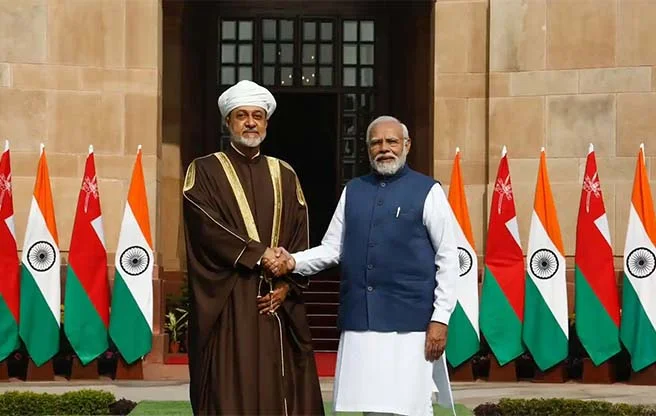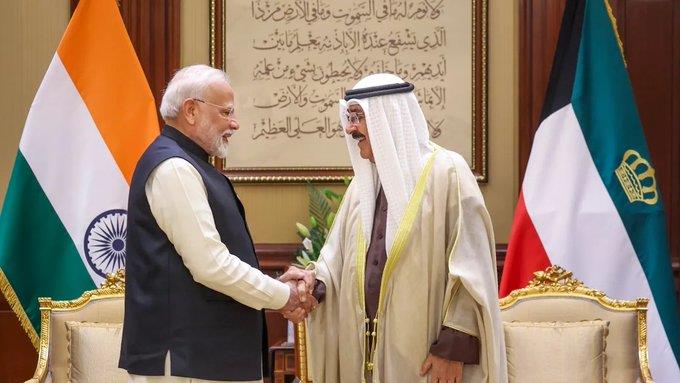Ties in Trade a decisive diplomatic move underscoring India’s growing influence in the Gulf region, External Affairs Minister Dr. S. Jaishankar met with Omani Foreign Minister Sayyid Badr bin Hamad bin Hamood Albusaidi in Muscat. The high-level talks focused on ramping up bilateral cooperation in trade, investment, energy security, and regional stability. The visit comes at a crucial juncture when both nations are redefining their foreign policies to adapt to a rapidly evolving global order.
The discussions weren’t merely ceremonial. They marked a meaningful leap toward a comprehensive strategic partnership that goes beyond traditional cooperation, anchoring it in economic resilience, cultural affinity, and mutual geopolitical interests.
A Renewed Economic Vision
India and Oman share a long history of commercial relations that date back centuries. The recent talks served as a platform to reimagine that history through a modern, forward-looking economic lens. The two ministers explored opportunities for enhancing bilateral trade volume, removing bottlenecks in investment flows, and creating new pathways for business-to-business and government-to-business collaborations.
India, with its booming startup ecosystem and manufacturing drive under the “Make in India” initiative, is eager to attract investments from the Gulf region. Oman, on its part, is looking to diversify its economy under its Vision 2040 strategy, which aims to reduce dependence on oil revenues by investing in sectors like logistics, tourism, mining, and innovation. The alignment of these economic goals offers a win-win scenario.

The leaders discussed the potential to initiate sector-specific joint ventures, especially in manufacturing, agriculture, digital infrastructure, and green energy. There’s also a clear push to enable small and medium enterprises (SMEs) from both nations to participate more actively in bilateral economic exchanges.
Energy Security: More Than a Transaction
A key pillar of the talks was energy security—an area of vital interest for both countries. As one of India’s reliable suppliers of oil and gas, Oman plays a strategic role in supporting India’s growing energy demands. But what makes this relationship special is the shift from transactional trade to collaborative energy security planning.
Both ministers spoke of long-term energy cooperation that includes upstream and downstream investments, technology transfer in clean energy, and development of strategic petroleum reserves. India is not only seeking consistent supply but is also exploring partnerships in hydrogen production, solar power, and LNG terminals.
There’s also growing interest in utilizing Oman’s strategic location as a hub for India’s energy imports to Africa and Europe, positioning it as a key link in India’s evolving energy corridor.
Celebrating 70 Years of Friendship
The talks took place against the backdrop of the 70th anniversary of diplomatic relations between the two nations. To commemorate this significant milestone, a special logo was unveiled jointly by Dr. Jaishankar and Minister Albusaidi. More than a ceremonial gesture, the logo symbolizes the robust and evolving friendship that spans trade, culture, people-to-people ties, and shared strategic goals.
As part of the celebration, a new book titled Mandvi to Muscat: Indian Community and the Shared History of India and Oman was released. This publication captures centuries of maritime trade, cultural exchanges, and the migration of Indian families who contributed to the economic and social landscape of Oman. It pays homage to the intertwined histories and offers a narrative of trust and continuity.
A Strong Diaspora Bond
Another key element that defines India-Oman ties is the Indian diaspora. As of August 2024, nearly 665,000 Indians reside in Oman, making it one of the largest expatriate communities in the Gulf nation. This diaspora has played a vital role in Oman’s development, particularly in healthcare, education, retail, and construction sectors.
During the talks, both ministers emphasized the need to safeguard the rights and welfare of these Indian nationals. Dr. Jaishankar reiterated India’s commitment to ensuring a safe, dignified, and empowered life for its citizens abroad, and thanked the Omani leadership for its consistent support and hospitality toward the Indian community.
Cultural Synergy and Shared Aspirations
Beyond economics and geopolitics, what cements the India-Oman relationship is a rich tapestry of cultural affinities. Language, cuisine, festivals, and values bind the two nations in subtle yet profound ways. Both ministers acknowledged the importance of enhancing cultural diplomacy through exchange programs, joint academic research, and tourism initiatives.
Plans are underway to organize more bilateral cultural festivals, promote educational exchanges, and foster ties between universities in India and Oman. These steps are expected to increase mutual understanding and strengthen people-to-people engagement.
Strategic Alignment in a Changing Region
The Gulf region is undergoing rapid transformation—economically, socially, and politically. In this context, India and Oman see eye-to-eye on many regional issues, including maritime security, counterterrorism, and economic diversification. The Indian Ocean, in particular, presents a theatre for joint maritime initiatives and naval cooperation. Both nations reaffirmed their commitment to a free, open, and inclusive Indo-Pacific region.
The ministers also touched upon the regional security landscape, particularly the need for sustained dialogue and diplomacy in resolving conflicts in West Asia. There was a shared sentiment that peace and stability in the region would unlock enormous potential for economic development and integration.
A Forward-Looking Partnership
What makes this dialogue significant is the depth and diversity of its scope. It wasn’t limited to grand declarations but focused on actionable outcomes. From setting up joint working groups to discussing digital public infrastructure, the India-Oman engagement appears geared toward practical, long-term cooperation.
With a renewed sense of purpose, both countries are poised to script a new chapter in their bilateral journey—one that is collaborative, future-focused, and aligned with the aspirations of their people.
As the world grapples with energy transitions, shifting trade patterns, and geopolitical flux, partnerships like India and Oman’s stand out as models of how shared history can pave the way for shared prosperity.



